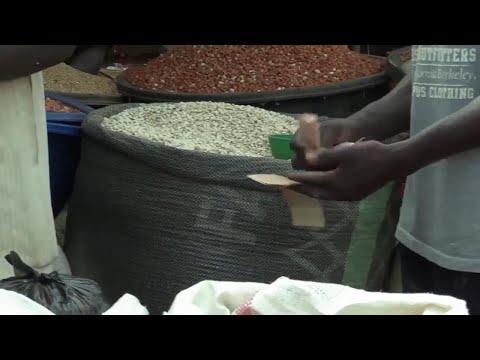(25 Jul 2024)
RESTRICTION SUMMARY:
ASSOCIATED PRESS
Niamey, Niger – 17 July 2024
1. Various of men buying food from market
2. SOUNDBITE (French) Hamssatou Saley, shopper:
“The market is really not affordable. Now just a cup of millet costs 1,250 (West African CFA franc) something that was less than 1,000 before, but now it is 1,250. Also the price of rice has increased.”
3. Various of traffic
4. SOUNDBITE (Zarma) Hamidou Ibrahim, shopper:
“Our main difficulty right now is the high cost of food on the market. We really want prices to drop. Otherwise, we thank God. May Allah bring us peace and security in our country.”
5. Various of people at market, traffic
6. SOUNDBITE (French) Harouna Mamane Nour, former employee at food processing company:
“Since the events of July 26, many Nigeriens have seen this situation impact their cost of living. Many have found themselves out of work. We can imagine the ordeal that these heads of family are experiencing with the soaring prices.”
8. Various of people at market, items at market
STORYLINE:
One year has passed since mutinous soldiers overthrew Niger’s president, Mohamed Bazoum.
Coup leaders said they deposed the elected government for two key reasons: its security and economic crises.
But those challenges have not only persisted, they’ve worsened.
And the country’s 26 million people, among the world’s youngest and poorest, are struggling.
The junta severed ties with key international partners, who imposed sanctions and suspended support affecting close to half of Niger’s budget.
On the streets, where thousands of people once cheered the coup, there is growing frustration.
Niger was the latest nation in West Africa to be ruled by a military junta, joining Mali and Burkina Faso.
The three countries went on to form what they called the Alliance of Sahel States, shortened to its French acronym AES.
They also announced their departure from the regional bloc known as ECOWAS, short for the Economic Community of West African States.
ECOWAS acknowledged their announcement but has not yet declared that the countries are no longer part of the bloc.
Following the coup, Benin closed its border with Niger, cutting off the country’s access to the port of Benin – the main route for imports.
ECOWAS also imposed sanctions, but they were lifted earlier this year.
With the border with Benin still closed and foreign aid petering out, residents in the capital, Niamey, are feeling the economic pinch.
Hamssatou Saley, who came to Niamey’s Wadata Market to buy food for her family, said basic staples were "really not affordable".
Another resident, Hamidou Ibrahim, said people like him needed prices to come down.
Niger is one of the poorest countries in the world, ranking at 189 out of 193 on the United Nation’s 2022 Human Development Index.
Its fertility rate is the highest in the world, at 6.64 children born per woman.
Many heads of families are providing for a large number of people on one salary.
Harouna Mamane Nour used to work at a food processing company, but is now unemployed, like many other Nigeriens.
He says he wants the authorities to find a solution to the rising cost of living.
Junta leaders from Mali, Burkina Faso and Niger met in Niamey earlier this month.
They ruled out a return to ECOWAS, which they accused of bending to Western interests.
Like Mali and Burkina Faso, Niger has pursued military relations with Russia and expelled French forces from the country.
U.S. forces have also agreed to leave the country by September 15.
Find out more about AP Archive: http://www.aparchive.com/HowWeWork
Twitter: https://twitter.com/AP_Archive
Facebook: https://www.facebook.com/APArchives
Instagram: https://www.instagram.com/APNews/
You can license this story through AP Archive: http://www.aparchive.com/metadata/youtube/4d190f9830ca4a0f9338991d6f97eafb
Author: AP Archive
Go to Source
News post in July 30, 2024, 6:04 am.
Visit Our Sponsor’s:
News Post In – News





